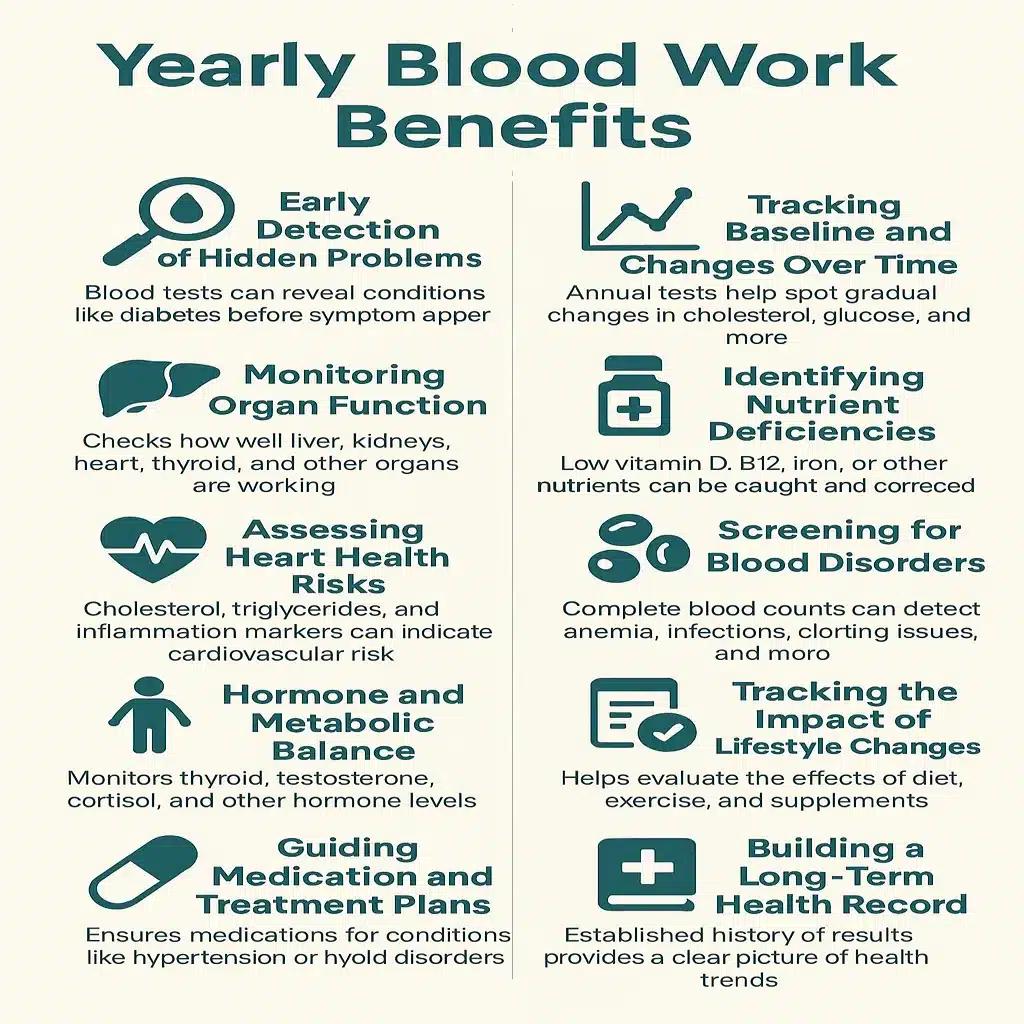
Approx. read time: 6.7 min.
Post: Yearly Blood Work Benefits: 10 Reasons It’s Essential for Health and Prevention
Yearly blood work benefits. In today’s fast-paced world, it’s easy to put off health checkups until something feels wrong. But here’s the reality: many serious health conditions develop silently for years before symptoms appear. By the time you feel “off,” the problem may already be advanced — and harder to treat.
That’s where yearly blood work steps in as one of the most powerful, cost-effective tools for staying healthy. Think of it as your body’s progress report, revealing what’s happening beneath the surface so you can take action early.
Here’s why making annual blood tests part of your routine isn’t just smart — it’s a potential lifesaver.
1. Early Detection of Hidden Problems-Yearly blood work benefits
Some of the most dangerous health issues are invisible in their early stages.
Diabetes, kidney disease, certain cancers, and autoimmune disorders can quietly progress for years without obvious symptoms. A simple blood test can uncover early warning signs — elevated blood sugar, abnormal liver enzymes, unusual protein levels — long before you’d notice anything in daily life.
Why it matters:
Catching a condition early often means easier, less invasive treatment, lower costs, and a better chance of full recovery. For example, prediabetes can often be reversed with lifestyle changes if caught in time, but left untreated, it can lead to lifelong complications.
2. Tracking Baseline and Changes Over Time
One test gives you a snapshot. Annual testing builds a timeline of your health. This record shows how your body is changing year to year, allowing doctors to spot subtle trends.
Your cholesterol might be “okay” now, but if it’s creeping upward each year, you can act before it crosses into the danger zone. Likewise, a slow rise in liver enzymes could hint at early fatty liver disease, giving you a chance to adjust diet and exercise before permanent damage occurs.
Why it matters:
Small, consistent changes — for better or worse — are easier to see and act on when you have data. It’s like catching a leak before it floods the basement.
3. Monitoring Organ Function-Yearly blood work benefits
Your organs are constantly working behind the scenes to keep you alive and well. The liver processes toxins, the kidneys filter waste, the thyroid regulates metabolism, and the heart pumps oxygen-rich blood to every cell.
Blood tests can assess the performance of these systems through key markers:
- Liver enzymes (ALT, AST) indicate liver health.
- Creatinine and BUN show kidney function.
- TSH, T3, and T4 reveal thyroid performance.
- BNP or troponin can point to heart stress or damage.
Why it matters:
Even mild changes in organ function can snowball into serious illness if ignored. Detecting them early means you can treat the cause and preserve long-term health.
4. Identifying Nutrient Deficiencies
Fatigue, brain fog, brittle nails, hair loss, or mood changes might not just be “getting older” — they could be signs of vitamin or mineral deficiencies.
Annual blood work can check for:
- Vitamin D (bone health, immune function, mood regulation)
- Vitamin B12 (nerve function, energy production)
- Iron/ferritin (oxygen transport, fatigue prevention)
- Magnesium, calcium, and folate (cellular function and repair)
Why it matters:
Deficiencies can impact quality of life and lead to chronic disease if not addressed. For example, low vitamin D is linked to osteoporosis, immune weakness, and depression — all preventable with early detection and proper supplementation.
5. Assessing Heart Health Risks
Heart disease remains the leading cause of death in many countries — and it often develops silently. Blood work can identify risk factors years before a heart attack strikes.
Key markers include:
- LDL (“bad”) cholesterol and HDL (“good”) cholesterol
- Triglycerides (fat in the blood)
- hs-CRP (inflammation linked to heart disease)
- Lipoprotein(a) (genetic heart risk factor)
Why it matters:
Knowing your cardiovascular profile gives you the power to make lifestyle changes — improving diet, exercising, quitting smoking — or to start preventive medications before irreversible damage occurs.
6. Screening for Blood Disorders
A Complete Blood Count (CBC) is a routine but powerful tool. It can detect:
- Anemia (low red blood cells or hemoglobin)
- Infections (elevated white blood cells)
- Clotting issues (abnormal platelet counts)
- Potential cancers (unusual cell shapes or counts)
Why it matters:
Blood disorders can lead to fatigue, dizziness, chronic infections, or even life-threatening complications. The earlier they’re found, the sooner treatment can restore normal function.
7. Hormone and Metabolic Balance
Hormones quietly govern almost everything in your body — mood, weight, sleep, energy, digestion, and even mental clarity.
Annual blood work can monitor:
- Thyroid hormones (metabolism, energy)
- Testosterone (muscle mass, bone density, mood in men)
- Estrogen & progesterone (reproductive health, bone health in women)
- Cortisol (stress response, blood sugar balance)
- Insulin (metabolism, diabetes risk)
Why it matters:
Hormonal imbalances can mimic other health problems or be dismissed as “just stress.” Left unchecked, they can contribute to weight gain, depression, chronic fatigue, infertility, and long-term metabolic disease.
8. Tracking the Impact of Lifestyle Changes
You started exercising more, changed your diet, or began taking supplements. But are they really helping?
Blood work offers objective proof. If your triglycerides drop or vitamin D levels rise, you know your efforts are paying off. If nothing changes — or things get worse — you can adjust before wasting time or money.
Why it matters:
Health decisions should be based on data, not guesswork. Blood work shows the real results of your lifestyle choices.
9. Guiding Medication and Treatment Plans
If you’re taking medication for high blood pressure, cholesterol, thyroid function, or other chronic conditions, blood tests confirm that it’s working without harming other parts of your body.
For example:
- Statins lower cholesterol but can affect liver enzymes.
- Thyroid meds may need dose adjustments based on TSH levels.
- Diabetes medications require monitoring to prevent low blood sugar.
Why it matters:
The right medication at the wrong dose can be as harmful as no treatment at all. Blood tests fine-tune your care for maximum benefit and minimal risk.
10. Building a Long-Term Health Record
Health isn’t static — it’s a moving target. A decade’s worth of yearly blood work creates a detailed record that helps you and your healthcare providers see patterns, anticipate risks, and make proactive decisions.
Why it matters:
When a new symptom appears, your history of results can help pinpoint whether it’s a sudden change or part of a long-term trend. This insight can speed diagnosis and guide treatment more accurately.
Making Yearly Blood Work a Habit
If you’re healthy and under 40, a yearly panel is usually enough. If you have risk factors — family history, chronic illness, or major lifestyle changes — your doctor may recommend more frequent testing.
Tips for making it routine:
- Schedule it with your annual physical. Pairing them together saves time and ensures follow-through.
- Keep copies of your results. Use a health app or folder to track your numbers year to year.
- Act on what you learn. Numbers mean nothing if you don’t use them to make changes.
The Bottom Line-Yearly blood work benefits
Yearly blood work isn’t about looking for problems — it’s about staying ahead of them. It’s the difference between waiting for your car to break down and giving it regular tune-ups.
By checking in on your body’s internal systems once a year, you can:
- Catch silent threats early.
- Make smarter lifestyle and treatment choices.
- Build a long-term record that makes your care more effective.
Preventive health is a team effort — and your blood tests are one of the simplest, most powerful tools in the game.
Your health is your most valuable asset. Don’t wait for trouble to knock — open the door once a year and check what’s going on inside.










